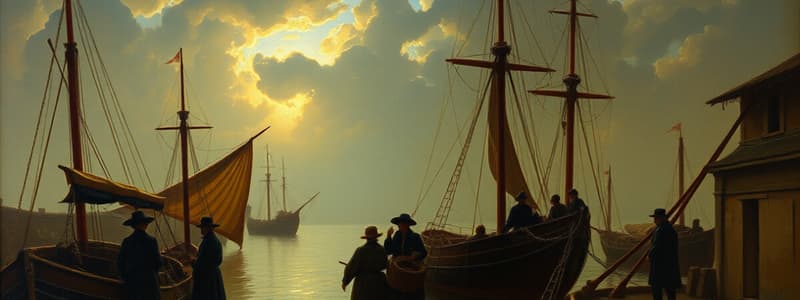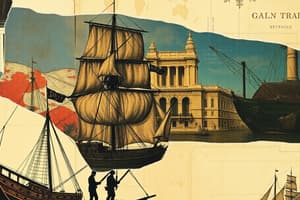Podcast
Questions and Answers
What was the Commercial Revolution?
What was the Commercial Revolution?
A period of economic expansion, colonialism, and mercantilism.
How long did the Commercial Revolution last?
How long did the Commercial Revolution last?
From the late 13th century to the early 18th century.
Where did the Commercial Revolution take place?
Where did the Commercial Revolution take place?
In Europe, mostly Italian city-states.
What caused the Commercial Revolution?
What caused the Commercial Revolution?
What are some effects of the Commercial Revolution? (Select all that apply)
What are some effects of the Commercial Revolution? (Select all that apply)
What is mercantilism?
What is mercantilism?
What was another economic system that gained popularity during the Commercial Revolution?
What was another economic system that gained popularity during the Commercial Revolution?
What is capitalism?
What is capitalism?
How did the Commercial Revolution change European society? (Select all that apply)
How did the Commercial Revolution change European society? (Select all that apply)
What is a favorable balance of trade?
What is a favorable balance of trade?
Flashcards
Commercial Revolution
Commercial Revolution
A period of European economic growth from the late 13th to early 18th centuries, fueled by trade and colonialism.
Mercantilism
Mercantilism
An economic system where a country tries to export more than it imports to gain wealth.
Capitalism
Capitalism
An economic system with private owners controlling trade and industry for profit.
Favorable trade balance
Favorable trade balance
Signup and view all the flashcards
Commercial Revolution's Causes
Commercial Revolution's Causes
Signup and view all the flashcards
Commercial Revolution's Effects
Commercial Revolution's Effects
Signup and view all the flashcards
Commercial Revolution Location
Commercial Revolution Location
Signup and view all the flashcards
Time Period of Commercial Revolution
Time Period of Commercial Revolution
Signup and view all the flashcards
Key effect of Commercial Revolution
Key effect of Commercial Revolution
Signup and view all the flashcards
Commercial Revolution impact on society
Commercial Revolution impact on society
Signup and view all the flashcards
Study Notes
Commercial Revolution Overview
- A period characterized by economic expansion, colonialism, and the rise of mercantilism.
- Lasted from the late 13th century to the early 18th century.
- Primarily took place in Europe, with a significant focus on Italian city-states.
Causes of the Commercial Revolution
- Population growth in Europe led to increased demand for goods and supplies.
- Desire for new resources and markets spurred exploration and expansion.
Effects of the Commercial Revolution
- Significant increase in global trade and commerce.
- Growth of the middle class, enhancing social mobility and economic participation.
- Led to inflation known as the "Price Revolution," where the prices of goods rose dramatically.
Mercantilism
- Economic theory emphasizing state intervention in the economy to realize a surplus in exports over imports.
- Focused on accumulating wealth through trade and colonial expansion.
Rise of Capitalism
- Emerged as an influential economic system alongside mercantilism during the Commercial Revolution.
- Defined as a system where trade and industry are controlled by private owners for profit rather than by the state.
Social Transformations
- Growth of the bourgeoisie or middle class, which gained social and economic power.
- Increased authority of European monarchies, which leveraged trade for greater power.
- Strengthening of major European nations like Spain, England, and France.
- Urbanization led to population increases in towns and cities, transforming societal structures.
Favorable Balance of Trade
- Economic condition where a country exports more than it imports.
- Indicates a strong economy as the nation sells more goods abroad than it purchases from other countries.
Studying That Suits You
Use AI to generate personalized quizzes and flashcards to suit your learning preferences.




